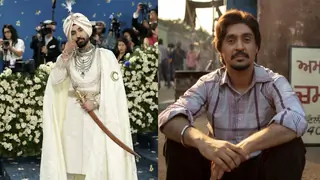Originally posted by: devkidmd
Now this is the Akbar we know and love.
What a fascinating journey!
It doesn't matter where you are only where you are headed.
One thing I would like to say is that we cannot ignore the influence of the people surrounding Akbar in his evolution into a more tolerant ruler.
Nature and nurture both are important. Most of us are the product of our environment.
I found it a little surprising that the imperial servants would blatantly disobey Akbar's orders and harass Shri Vithal Rai. I am sure they were aware that this was someone who was revered by Akbar's chief queen. That too in Mathura and not some far flung territory.
Did you personally take the pictures of the old temple Abhay? They are beautiful.
Thanks once again for a great post.
Devki
Devki,
I am in complete confirmity with your views in bold. Almost nothing can be added to improve it. We already have conducted lots of discussion about this. Not written any proper reply since last many days, writing one today. :)
Now this is an interesting question regarding disobeying the orders of the ruler. But, this is true at the same time.
You saw that, first Akbar gave a farman to this saint.
http://mariam-uz-zamani.blogspot.com/2015/06/first-farman-of-akbar-vithalrai-gokul.htmlLater, it had to be re-inforced by the farman of Mariam Makani when she ordered no one should harass this saint.
http://mariam-uz-zamani.blogspot.com/2014/12/farman-of-hamida-banu-begum-with-scan.htmlInspite of all this, the present farman, which came after many other farmans of Akbar clearly mentions that no one should harass the saint, and no bribes, etc. should be demanded from him ; which clearly re-inforces one point - such things happened despite the liberal policies of rulers.
And this is quite understandable, Akbar ruled from Agra, and later from Lahore, before coming back to Agra. But, his empire was big enough. We can not guarantee that all his officers will follow the principles which were laid down by him. Some of them might be guided by some narrow minded ideas.
This is same as any modern day government in any country. The government may launch any number of good policies for the citizens but they will not show results unless the bureaucracy which works at the grass root level also shows a similar zeal for implementing them with honesty.
Same was the case in medieval times. When such things could happen
even in Agra, near Akbar. Then, they may happen in other areas as well. The same rationality can not be expected from their officers, who were not so broad minded.
I did not want to write/leak it now only. :-P
But the topic is such that i am tempted to write about this. A foreign traveller came to India in late 16th Century and he has mentioned an interesting observation about the religious freedom given to the citizens. He mentions that he was FORCED by a Maulvi in Lahore regarding his religion and faith, and to offer the prayers in mosque.
Note that all this happened despite Akbar staying in Lahore itself that time.The traveller mentions, he complained to Akbar about this, and Akbar called the maulvi and admonished the maulvi before everyone. The traveller also mentions about Akbar, Salim and Mariam-Uz-Zamani. His words about the honor commanded by the Queen of Hindustan - the mother of Salim, in the court was interesting ; and also the praise of religious freedom given by Akbar.
I read this last year, but could not post it till now, though i shared on Twitter already. This will be a future post, i have to collect the scans from this account which i am searching.
There is also a farman of Akbar given around 1601-02 to his officers in Gujarat where he orders them, not to demolish the temples. Prince Daniyal was the one who saw that the orders of Akbar were fulfilled without any laxity.
One may note that, though Akbar was liberal in this time, but his officers in Gujarat were not. There is a difference between the ruler and actual officers. I gave the example of government policies and bureaucracy.
Orthodoxy was the norm of that age, the rulers could understand and behave in a broad manner, but not their officers who were mostly guided by narrow principles. Exceptions may be there.
Remember the saying which i keep on mentioning many times ? -> "Religion is the opium of masses. It is the soul of soul-less society, and heart of heartless world. "
They rulers are mature people who know when to "use" it and when not to, like Akbar "used" it in Chittor. Radhika's comment was awesome, the journey of Akbar from early part of his life to the end is enough to fascinate anyone who views all his actions.
You might have seen the party cadres of 2 rival parties "clashing" with each other, but you will never find the highly placed leaders of the
same party clashing with each other despite any amount of rivalry. On the other hand, they might be presiding over the same function at that time. :-P
The moral is again the same, as i mentioned in above.
Also, one of the reasons for translating the Sanskrit works of ancient India, etc. into Persian was given as follows by Fazl - "To remove the venomous feelings between the communities. " Unless, you know the culture properly, you can not 'understand' what the other community really believes in.
I did not take the pictures of temple myself, but obtained them from someone who stays there only. I have visited this temple many times. I am glad you and many others liked this post. :)
































29